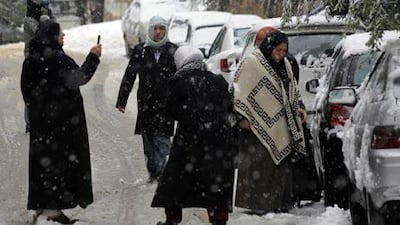BEIRUT // At least three people died as heavy rain, high winds and snow lashed Lebanon, Syria, Jordan and Turkey, causing havoc after months of drought.
About 15km off the coast of Israel, a Moldovan freighter carrying a shipment of steel sank yesterday in winds of 100kph and waves up to 10 metres high. The 11 Ukrainian crew were rescued unharmed.
In the northern Lebanese city of Tripoli, a woman was killed late on Saturday when the storm uprooted a palm tree that fell on her car.
At Beirut international airport, flights were delayed and four small planes on the tarmac were badly damaged by strong winds. Winds also caused havoc along the coast where about 60 per cent of Lebanese population live. Waves up to six metres pummelled Beirut’s Corniche, damaging many of its upmarket private beach clubs as bars and restaurants were flooded with seawater and buildings were pounded.
The storms have ended Lebanon’s exceptionally long, dry summer. The country has had just more than 50mm of rain since September, down from 214.8mm in the same period last year, according to the meteorological department of Lebanon’s Civil Aviation Authority.
This storm dumped about 200mm of much needed rain on the territory, and sent coastal temperatures plummeting from the mid-twenties to 10C and, in the mountain areas, to 5C.
The Syrian capital, Damascus, was hit by a snowstorm yesterday morning, as gale-force winds and freezing rain continued to batter much of the country’s central and western regions for a second day. Power was cut frequently in the capital and traffic was severely disrupted by flooded roads.
Syrian authorities closed the Mediterranean port of Tartuz because of gales.
Many Syrians struggled as their homes, ill equipped to cope with such weather, failed to keep out the deluge. Sewers backed up and overflowed and, even in newer parts of Damascus, water poured in through leaking roofs.
“It has never been like this before,” said Abu Hamza, a resident of Sahnaiya, a middle-class suburb on the southern edge of Damascus, as he and his wife cleaned their basement flat flooded with sewage. “The infrastructure just can’t cope with this, I hope it ends soon.”
Temperatures in Istanbul fell to 3°C on Friday, a drop of 10 degrees in hours. Snow fell in some parts of the capital, accompanied by strong gusts reaching 90kph.
In Mugla province, in south-western Turkey, up to 10cm of snow was reported and a plane carrying the Turkish prime minister, Recep Tayyip Erdogan, to Siirt city was re-routed because of the weather.
In western Turkey at least 1,000 people were stranded, with some trapped in their cars by snow. The Turkish Red Crescent assisted with food and blankets.
On Friday, a “medium state of emergency” was declared in Jordan’s capital, Amman, in anticipation of the strong winds and thunderstorms. The government urged people to avoid valleys because of the threat of flash floods.
On Saturday, 16 people were injured in a 10-car pile-up, blamed on poor visibility. The Jordanian Ministry of Public Works deployed 900 vehicles, buses, bulldozers and snow blowers, as well as additional technicians and engineers, to deal with weather-related emergencies.
Rainfall statistics from the Jordanian Department of Meteorology showed that the highest amount of rainfall reached 21.5mm in the northern Jordanian valley, six per cent of the rainy season average.
“This is not enough for the crops,” said Fheid Tueimeh, the director of the National Centre for Weather Forecasts at Jordan Meteorological Department. “Rainfall should have at least made 30 per cent of the season between September and November.”
* With additional reporting by Phil Sands in Damascus, Suha Philip Maayeh in Amman and Thomas Seibert in Istanbul

